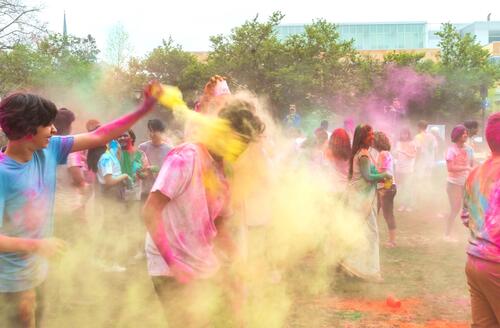
by: Sandeep Kumar Mishra, PhD (Postdoctoral Associate)
India, a land of astounding diversity, is blessed with a rich cultural tapestry woven from a multitude of religions, languages, and traditions. Majority of Indians perceive religious diversity of the nation as an asset rather than a liability, highlighting a positive perspective on the varied religious landscape in the country (Religion in India: Tolerance and Segregation, Pew Research, 2021). Diversity of India treasures its most vibrant expression in the country’s countless festivals, each a unique thread adding to the magnificent fabric of Indian life.
India embraces a diverse array of religions, encompassing Hinduism, Islam, Christianity, Sikhism, Buddhism, Jainism, and numerous other faiths. Each religion brings its own set of beliefs, rituals, and practices, contributing to the cultural mosaic of the country. The Constitution of India guarantees the right to freedom of religion, fostering an environment where people of different faiths can coexist peacefully.
Many festivals in India are deeply rooted in religious and spiritual beliefs. Diwali, Festival of Light, holds immense importance in Hinduism, symbolizing the victory of light over darkness and good over evil. Navratri, a nine-night festival dedicated to the worship of the Goddess Durga, signifies the triumph of virtue over vice. Ganesh Chaturthi, a ten-day festival dedicated to Lord Ganesha, celebrated with the installation of Ganesha idols and subsequent immersion in water. Likewise, Muslims celebrate Eid to commemorate the end of Ramadan, the sacred month of fasting, while Christians across the country observe Christmas. During Christmas, churches are adorned beautifully, creating an atmosphere infused with joy and spirituality. The exchange of gifts is a customary tradition during this festive season. These celebrations not only serve as platforms for religious expression but also cultivate a sense of unity among diverse communities.
Aside from religious celebrations, India also observes numerous cultural festivals that spotlight the nation’s abundant artistic heritage. Holi, known as the Festival of Colors, is a joyous occasion marking the onset of spring. Participants engage in throwing colored powders and water at each other, symbolizing unity, and fostering a spirit of camaraderie. The Kumbh Mela, a massive religious gathering at the confluence of sacred rivers, stands as one of the world’s largest. Drawing millions of pilgrims, it provides an opportunity for devotees to cleanse their sins by bathing in the holy rivers. The Pushkar Camel Fair, held in Rajasthan, is a distinctive fusion of cultural and trade activities, featuring the trading of thousands of camels alongside captivating cultural performances. Additionally, January witnesses the celebration of a harvest festival, known as Baisakhi, Makar Sankranti, or Pongal in various regions of India. This festival signifies the sun’s transition into the zodiac sign of Capricorn and is marked by traditional rituals, vibrant rangoli creations, and cultural performances.
The celebrations of New Year in India reflect the country’s secular and inclusive ethos, with people of different backgrounds coming together to celebrate the joyous occasions. New Year’s Eve is often associated with parties, gatherings, and events. Whether it’s the festive lights, the spirit of giving, or the sense of hope for the future, the celebrations embody the unity in diversity that is a hallmark of Indian culture. While New Year’s celebrations are often secular, some people choose to begin the year with visits to temples, churches, mosques, or other places of worship, seeking blessings for a prosperous and harmonious year ahead. Like in many parts of the world, individuals in India often make New Year resolutions to set goals and aspirations for the coming year. It’s also a time for reflection on the past year’s achievements and lessons. Some regions organize cultural events and performances, including traditional music and dance, to mark the transition to the New Year. These events reflect the rich diversity of Indian traditions.
Festivals in India play a crucial role in promoting social harmony and unity. Regardless of their religious or cultural background, people come together during festivals to celebrate and share joy. Festivals provide an opportunity for individuals to break free from the monotony of daily life, strengthen familial bonds, and forge new friendships.
Happy Holidays!